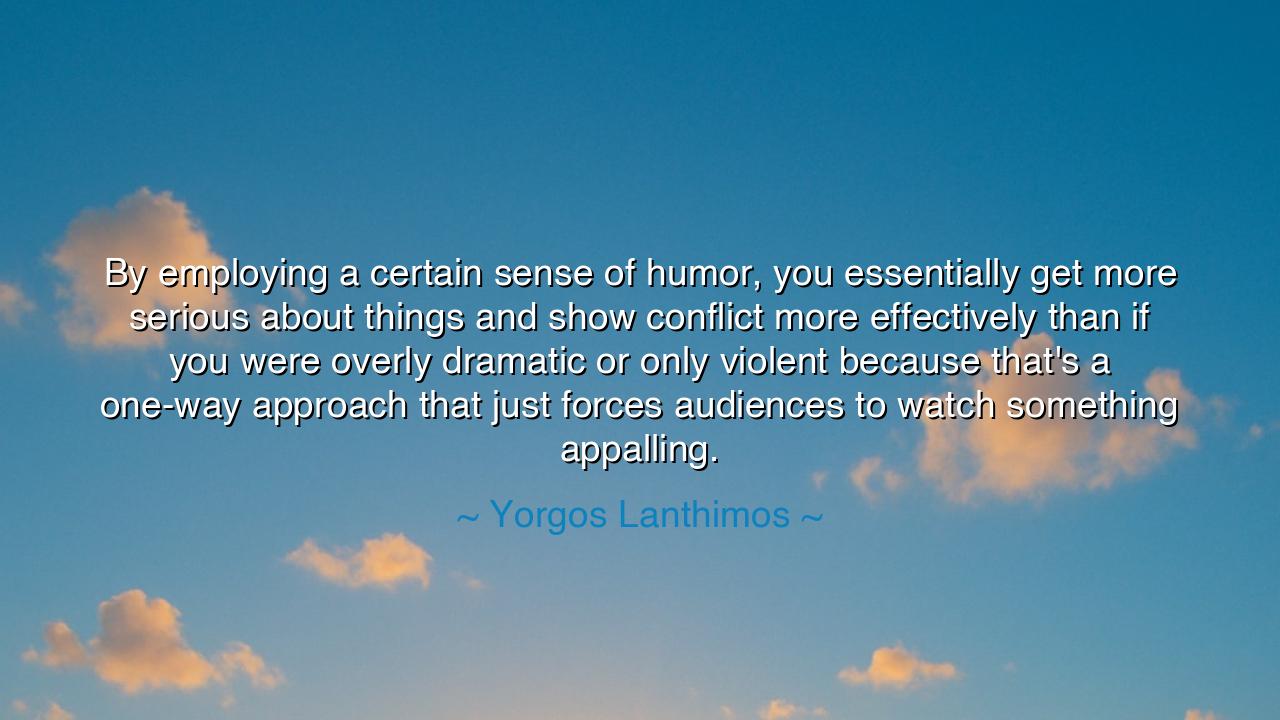
By employing a certain sense of humor, you essentially get more
By employing a certain sense of humor, you essentially get more serious about things and show conflict more effectively than if you were overly dramatic or only violent because that's a one-way approach that just forces audiences to watch something appalling.






The words of Yorgos Lanthimos, “By employing a certain sense of humor, you essentially get more serious about things and show conflict more effectively than if you were overly dramatic or only violent because that's a one-way approach that just forces audiences to watch something appalling,” carry within them the profound wisdom of the paradox. In them lives the eternal dance between lightness and gravity, laughter and sorrow, humor and tragedy. He speaks as the ancients once did — with awareness that truth cannot be swallowed whole; it must be delivered gently, wrapped in wit, or softened by laughter, lest it crush the soul beneath its weight.
For even in the old world, the great dramatists knew this secret. Aristophanes cloaked his sharpest truths in comedy, using laughter to pierce deeper than tears could. And Shakespeare, that magician of words, hid philosophy in jest and sorrow in mirth. The fool, he knew, could speak what the king could not. So when Lanthimos speaks of using humor to reveal conflict and seriousness, he continues this sacred lineage — that laughter, wielded wisely, is not a shield against pain but a mirror that reflects it more clearly. The one who can laugh at darkness does not mock it; he masters it.
When one relies solely on violence or drama, as Lanthimos warns, one narrows the soul’s path. Overwhelming the senses with horror or misery makes the audience look away, not inward. It is the easy road — to shock, to display agony until hearts turn numb. But humor, subtle and knowing, does something greater: it disarms. It opens the heart before delivering the blow. Through laughter, the mind becomes receptive; through irony, it perceives truth that would otherwise be too painful to bear. Thus, the playful becomes the profound, and the comic becomes the vessel of revelation.
Consider the story of Charlie Chaplin, the great silent philosopher of the modern age. In The Great Dictator, he made the world laugh even as he mocked tyranny. Beneath the absurd mustache of the clown, he unmasked the cruelty of the oppressor. Had he chosen only violence or tragedy, the film would have been unbearable; but through humor, he turned horror into understanding. He made millions confront evil not with despair, but with courage. In this, he embodied the truth Lanthimos speaks of: that to laugh at darkness is not to diminish it, but to steal its power.
There is a secret strength in this balance — the alchemy of tone, where the bitter and the sweet coexist. The ancients called it harmonia, the sacred blending of opposites. A sword may strike, but a jest can awaken. A tear may cleanse, but a laugh can heal. When the artist, the storyteller, or the philosopher wields humor with intention, he wields not triviality, but transformation. For humor is the bridge between fear and wisdom, a light that reveals the cracks in the human heart without breaking it apart.
In Lanthimos’s own works, such as The Favourite or The Lobster, the laughter that emerges is strange, uncomfortable, sometimes even cruel. But this is no ordinary comedy — it is absurdity as insight, satire as revelation. His humor does not protect us from the truth; it thrusts us deeper into it, forcing us to see the grotesque beauty of human contradiction. Through laughter, he unveils our vanity, our hunger, our endless longing to control what cannot be controlled. And in doing so, he fulfills the highest calling of art — not merely to entertain, but to awaken.
Thus, the lesson is this: when faced with conflict, seek not to overwhelm with force, but to illuminate with wit. When life wounds you, try to smile — not to hide the pain, but to rise above it. Let your humor be intelligent, compassionate, and self-aware, not cruel or shallow. For laughter born of wisdom is a weapon more potent than any blade. It cuts through despair without spilling blood; it teaches without preaching.
And so, as the ancients would counsel: be fierce in your truth, but gentle in your delivery. Let your words dance, not strike; let your art reveal, not repel. The world does not need more horror — it needs clarity. And if that clarity must come wrapped in laughter, then laugh boldly, laugh wisely, and let that laughter become the light through which others may see.






AAdministratorAdministrator
Welcome, honored guests. Please leave a comment, we will respond soon